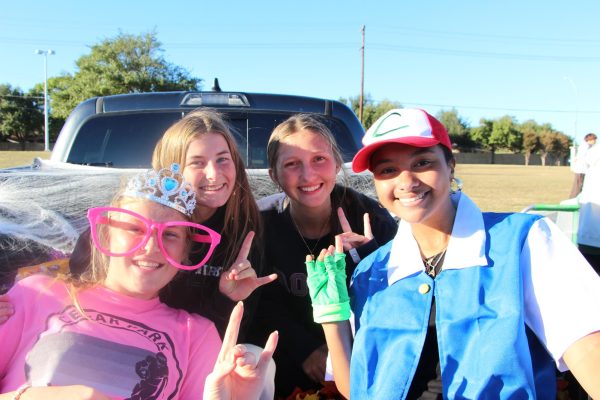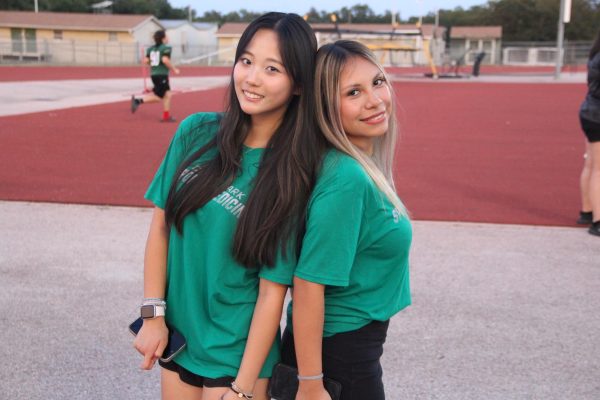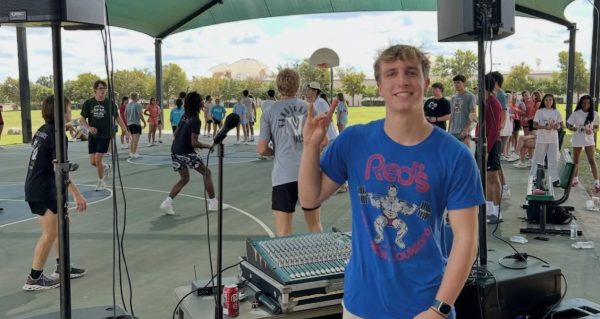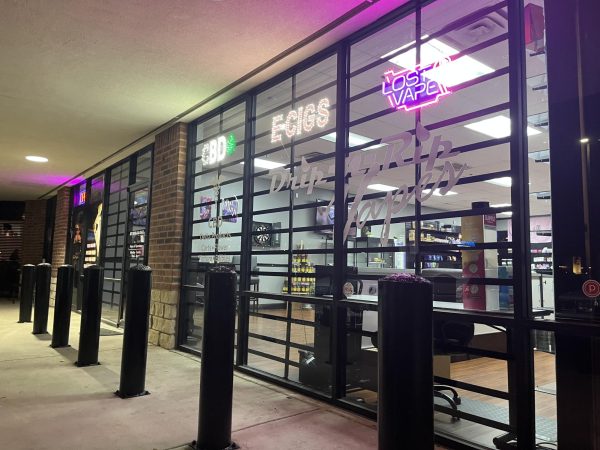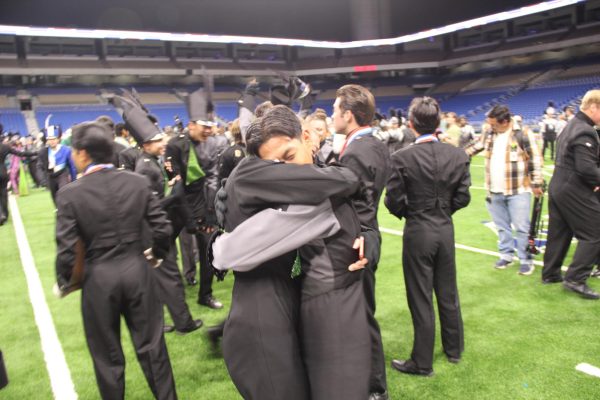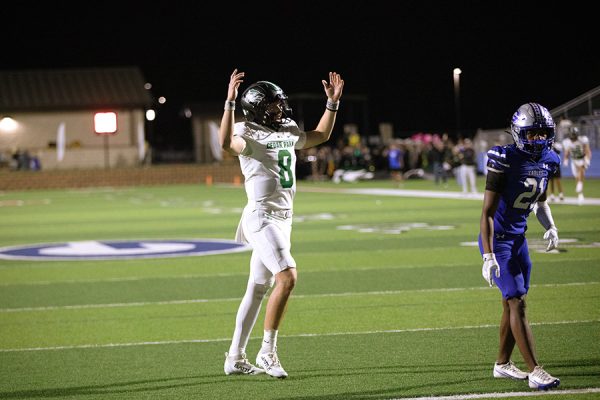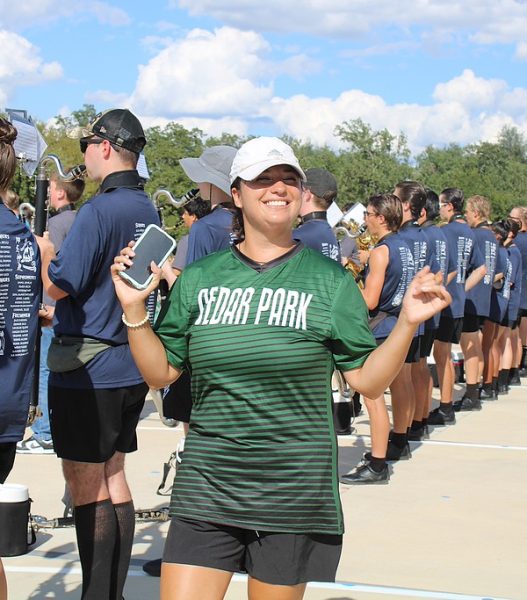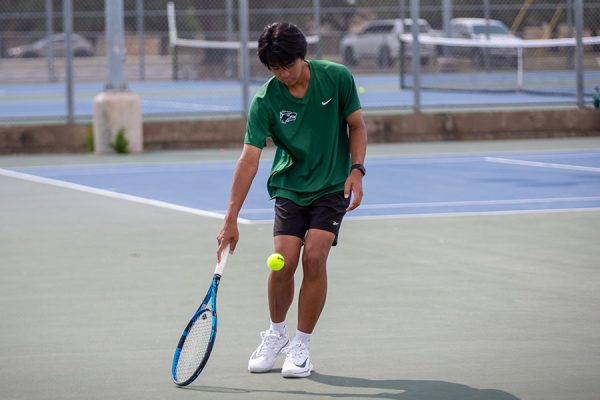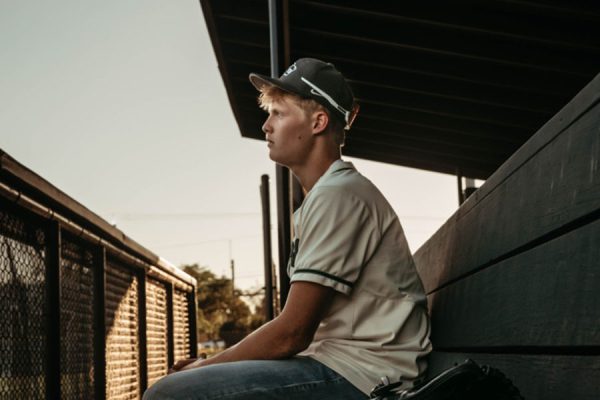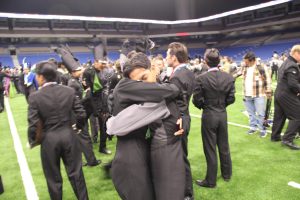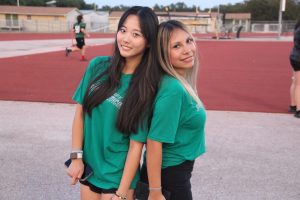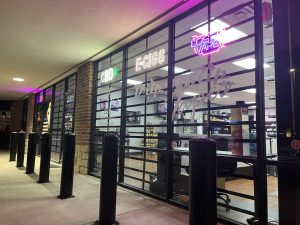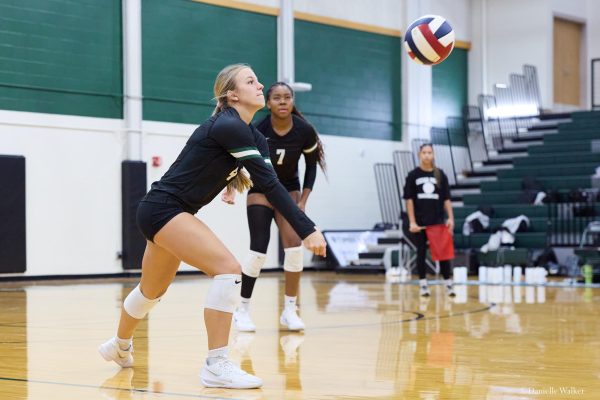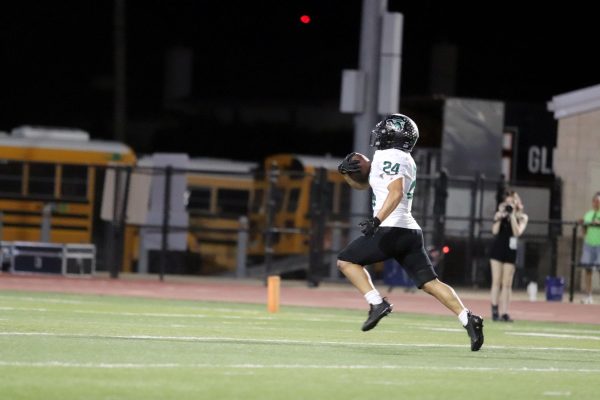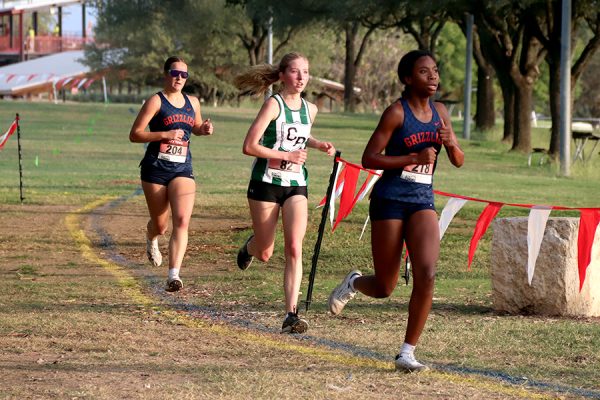No Sleep ‘Til State
DECA Teams Advance 10 Students
Photo Courtesy of Ariana Balakrishnan
DECA teams pose with their medals at districts on Jan. 22, where 10 students advanced to the State Competition. This year Districts was held at Cedar Ridge high school and consisted of students from Leander, Round Rock, and Austin school districts presenting in either written or role play events. “I’m really excited, not just for my team but for our entire chapter,” junior Ariana Balakrishnan said. “It’s a really big deal for us. Sending most of our competitors to State, especially after our year off, is really exciting cause now we’re back in person we can finally experience it like normal we get to see people get to talk to new members from other chapters it’s so just exciting.”
February 22, 2022
Faces are illuminated with the hue of computer screens, eyes are droopy on the brink of sleep despite the copious amounts of energy drinks consumed. It’s 2 a.m. and juniors Ariana Balakrishnan, Ainsley Harlan and Delany McClure work through the night to finish their DECA district presentation that they would present the next morning at Cedar Ridge. Little did they know, this night of work would advance them to State competitions alongside 10 other DECA students.
District was held on Jan. 22, and was the gateway for teams to advance on to State. This year, the DECA chapter sent 16 students to compete in Districts, and out of those 16, 10 students advanced to State. During Districts, teams made up of two or more students either put their quick-thinking skills to work with role-plays or came up with a constructed paper covering a topic of their choice to present to judges on the day of the District competition. Some events requiring tasks like exams and time limits put special emphasis on the stress that comes with the race to state, according to Balakrishnan.
“For moving on to State for our event, it isn’t as chaotic as a lot of the role plays,” Balakrishnan said. “[Students involved in] the role plays get a whole new different scenario that they have to adapt to and compete, but for my event, which is called a written event, we basically already wrote our paper and came up with our presentation and all of that, so from the end of districts to actual state on the 24th, we basically just edit this paper and edit this presentation.”
According to sophomore Amanda Eklund, the role plays are a different story. Eklund and her partner, sophomore Phoebe Solberg, competed in marketing decision-making, which requires them to think on their feet and use teamwork in order to ensure their presentation is well received. The presentation is prepared during the actual competition in a 30-minute time frame, and then presented to judges. The teams are given a packet containing the case and the roles they play in this case. They then need to use their quick-thinking skills to solve the case and meet their required performance indicators, in order to score well.
“Basically, we take a test and then we go in and we get a prompt and then we get 30 minutes to prepare and then we get 30 minutes to present,” Solberg said. “I don’t have any worries [about our event], the only worry would be if there’s something we don’t have knowledge on yet. They ask questions after we present, so honestly I just hope that my partner knows it and if my partner doesn’t know, then I just try to say something that sounds knowledgeable.”
Even with both events having their own requirements, one thing they have in common is that in order to give their best performances at State they will need to have the proper preparations. The editing process is different for both events, but it is equally an important part of preparing for State, according to junior and DECA President, Ethne Barnes. Barnes and her partners, Claire Poulter and Paisley Schalles, compete in the Integrated Marketing Campaign, which is a written event.
“There are no major changes [to our paper], though we expanded part of our subscription service to not only include businesses, but also hotels per recommendation and we made some modifications to our target market again per some recommendations from our judge,” Barnes said. “It’s really nice because we do get feedback being in the written event and we are allowed to make those tweaks as we see fit between district and state.”
While the writing events have time to accept feedback from judges on specific parts of their paper they can go back and edit, the students participating in role-playing events have to start over and try their best to predict what will be asked of them at these competitions.
“Right now we’re looking through all of the topics that could hit on our roleplay and what requirements we’d have to hit in our presentation that we’re preparing in the moment,” Eklund said. “We’re going through and trying to understand what each of those means so that we can go into it with a better idea.”
Last year, during the height of COVID, the State competition was virtual, but this year the competition is back in person and will be the first time for many of the competing students to present face to face with the judges.
“My team and I joined sophomore year, which of course was COVID, so we have competed in State, we just haven’t gone to an in-person meet,” Harlan said. “This District meet was our first in-person [competition] and I think we’re pretty well prepared for it I don’t think it was anything that really threw us off, it was just very different than starting virtually and having like a week to get your event done, where in-person you have like an hour to get everything ready.”
Despite the worries of coming back to in-person and presenting in front of judges face-to-face, students are excited to get things back to normal and have the full DECA competition experience, according to Balakrishnan.
“I am very nervous, but also with State you get the entire day to spend at the hotel so you just get to build a community with all of the state DECA,” Balakrishnan said. “There are chapters from Dallas, Houston and San Antonio, so I feel like that is going to be a really unifying experience and help get our chapter out there also at our state competition we vote as an entire Texas DECA to vote on our DECA representative or Texas State Representative so that’s going to be super fun.”
According to Harlan, these competitions are a great way to build students’ experience with entrepreneurship and future important life skills. The program opens students up to allow students to participate in the events that contain their interests.
“DECA is an organization in which students all around the country are given the opportunity to explore and work through different business scenarios,” Harlan said. “It’s a nationwide organization and you get to pick the event that you compete in, and there are so many different events. [The Event] can be anything from food marketing to Sports Marketing, to finance advertising and social media advertising; basically anything you’re interested in. There’s a lot of entrepreneurship and start-up business plans. It really gives you a very wide range of things, so that you’re able to pick what works for you. You’re able to get something and go work on it and compete with it and you can choose events that are individual or you could choose one that has a team.”
Though it’s encouraged, competing in these competitions is not at all required for all members of DECA. According to Balakrishnan, many people are scared away from getting involved because of the fear of competing in these competitions. Competing in these competitions is only one of the many ways to get involved in the chapter.
“I feel like people are scared to get involved because they have this stigma with DECA of ‘oh if you’re joining you’re going to be competing’,” Balakrishnan said. “But a good amount, about half of our chapter right now, just general members, and they just help us do service projects. They come twice a month. It’s a super chill experience you do not have to compete at all, it’s just if you really want to get involved in the program.”
DECA is a great way to help introduce the topic of future jobs and the requirements for these jobs, according to Eklund. Even students who don’t compete still achieve basic social skills and great opportunities to discover what they want to pursue in the future.
“For me, I think that marketing is what I want to do in the future,” Eklund said. “So it’s really interesting to be able to explore it more to see if it’s really something I’m interested in. I really do think that it does because it gives more experience and it’s just a better big picture to look at what it is.”

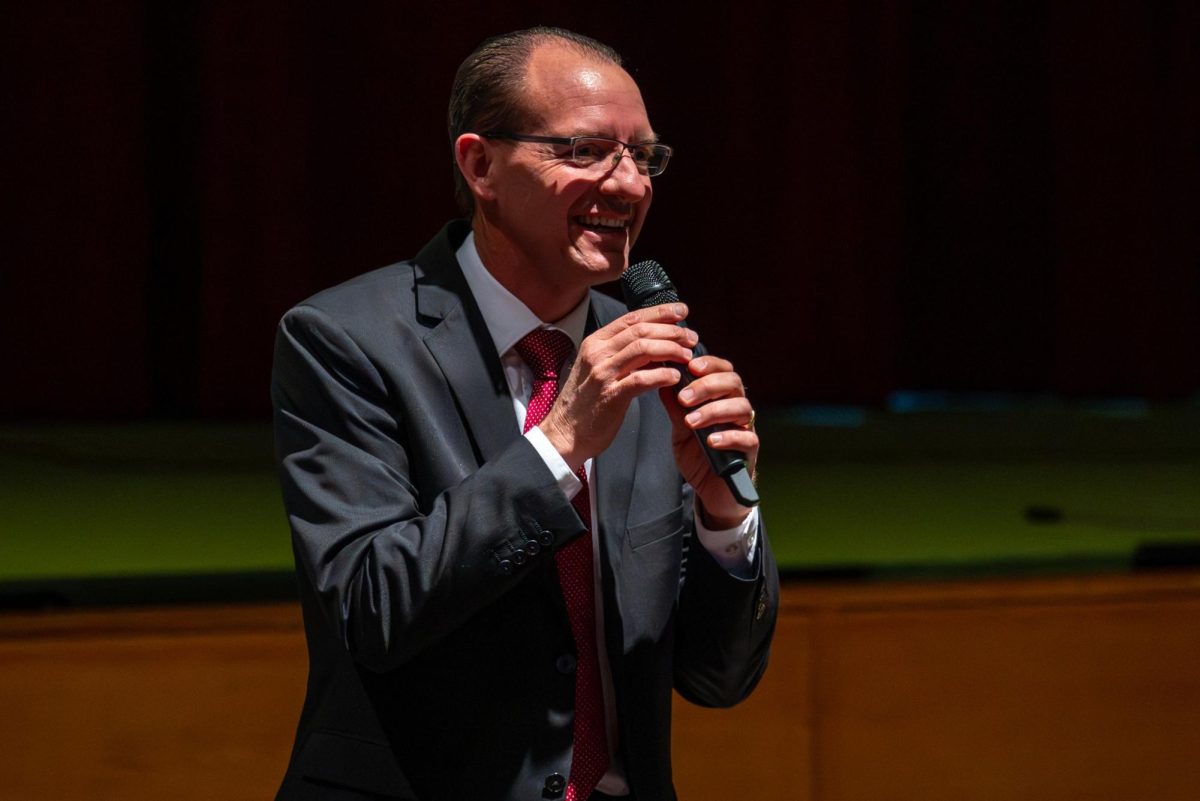
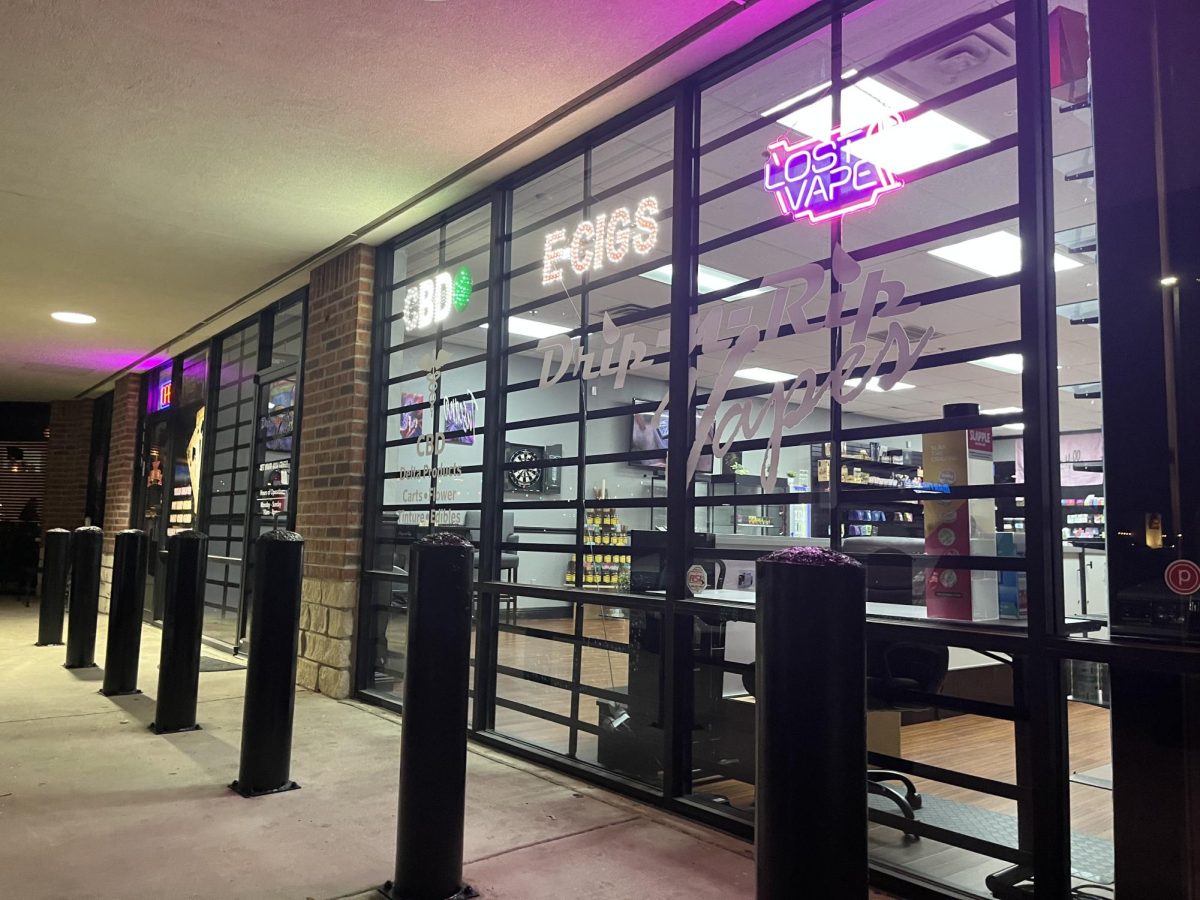
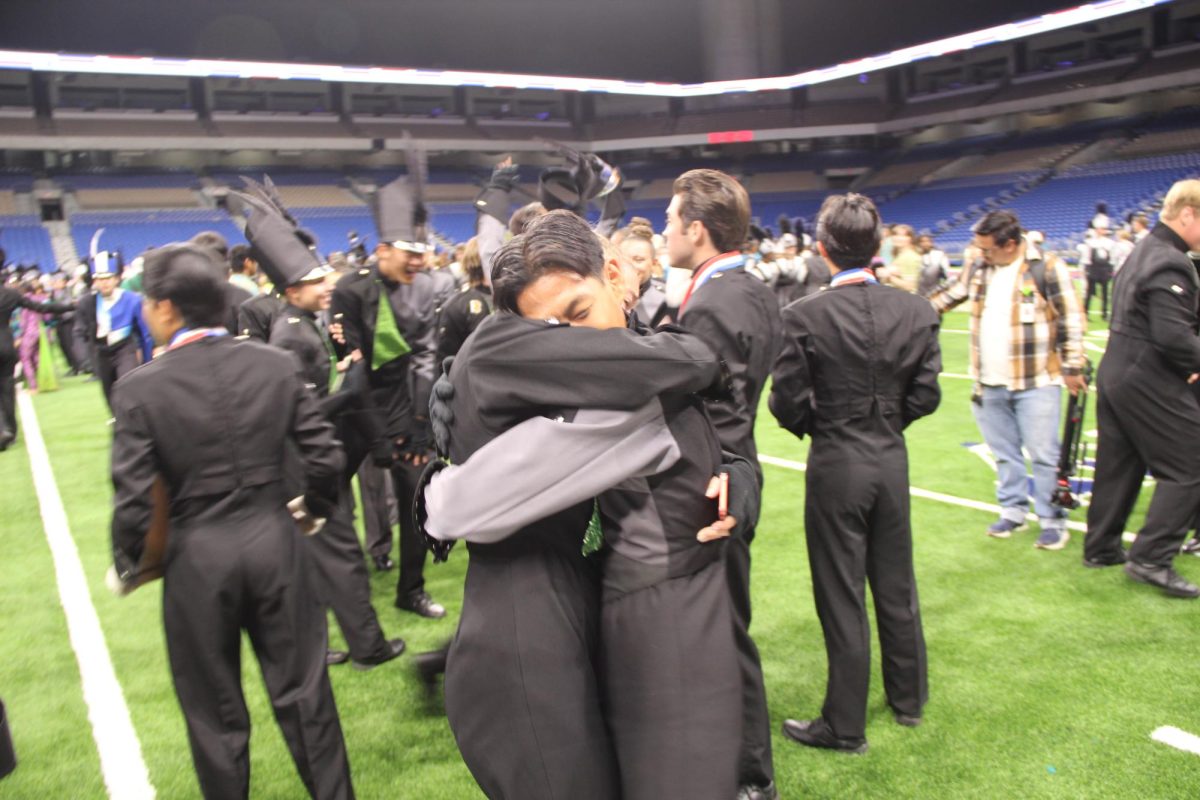
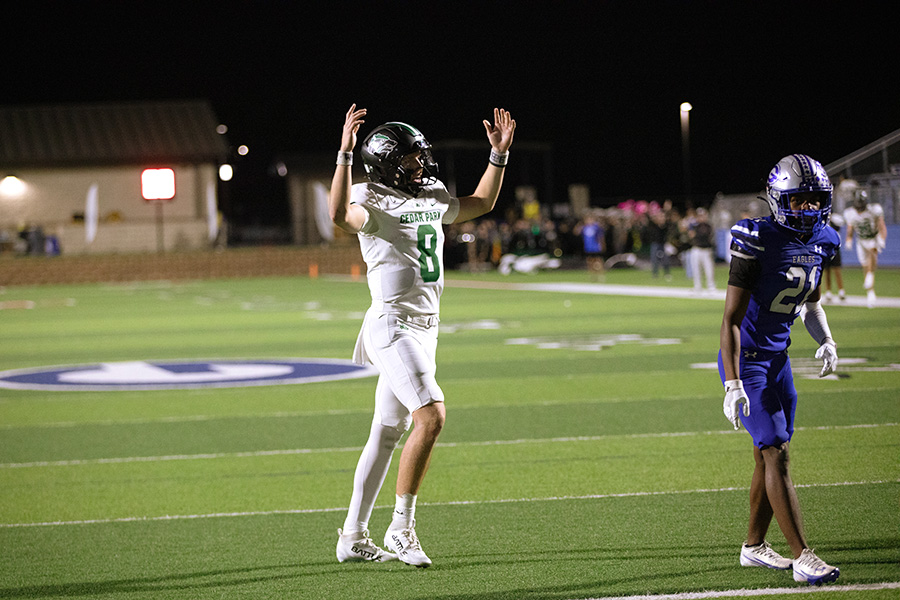
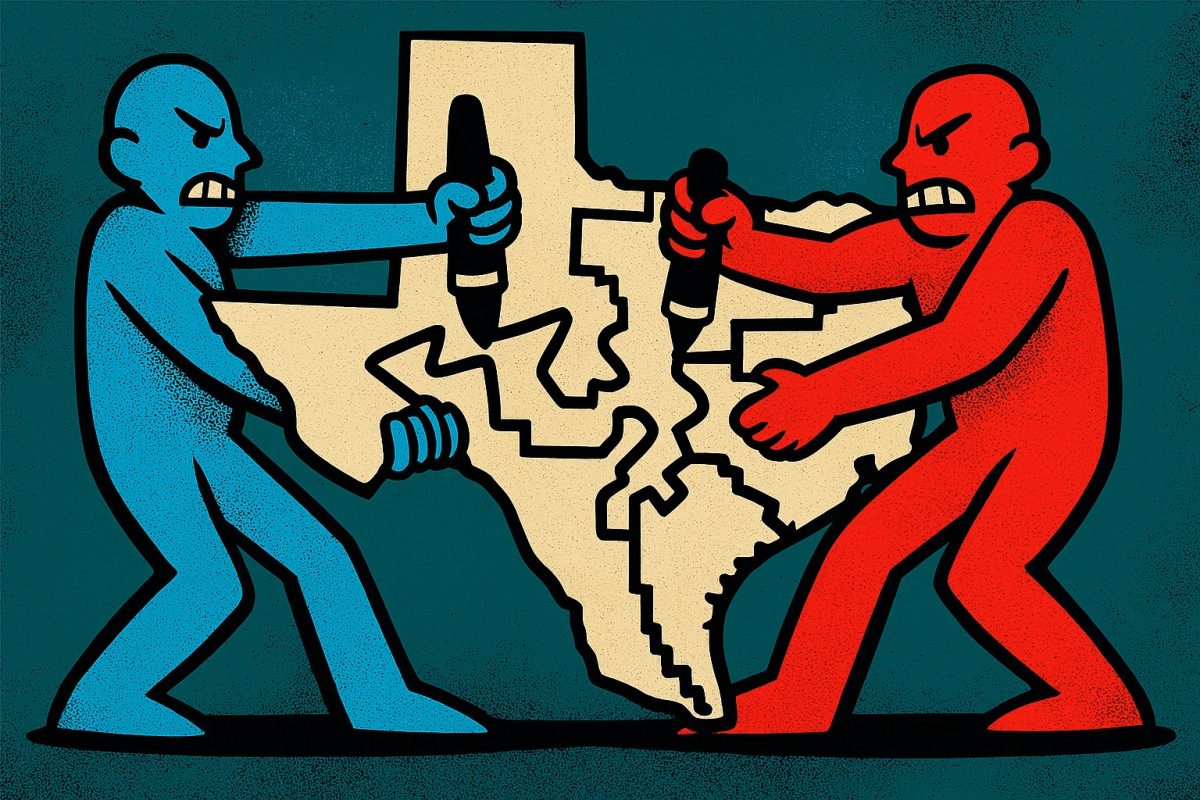
![Senior Jett Mckinney stores all the clothes in his own room, with half of it stored in his closet along with his personal clothes, and the rest taking up space in his room.
“There’s been times [when] there’s so much clothing stored here and it gets overwhelming, so I end up having to sleep somewhere else in the house,” Mckinney said.](https://cphswolfpack.com/wp-content/uploads/2025/11/DSC_0951-1200x800.jpg)
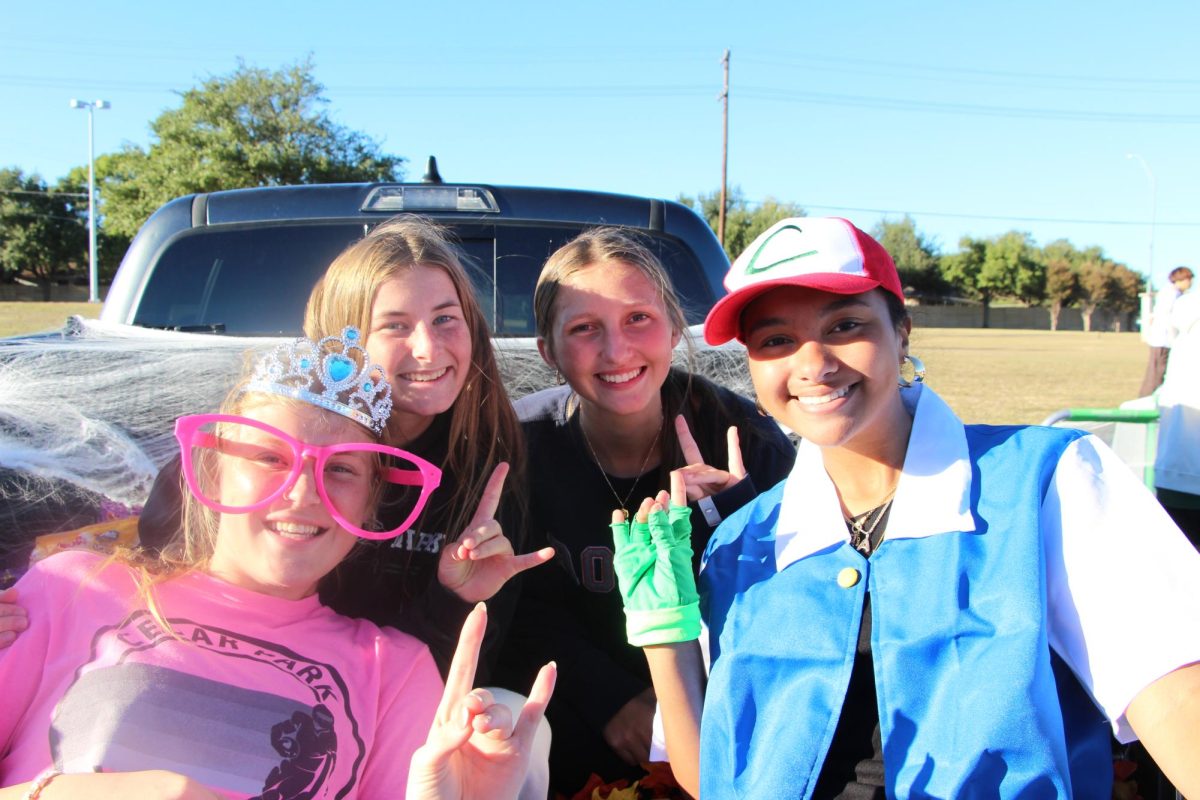


![Broadcast, yearbook and newspaper combined for 66 Interscholastic League Press Conference awards this year. Yearbook won 43, newspaper won 14 and broadcast took home nine. “I think [the ILPC awards] are a great way to give the kids some acknowledgement for all of their hard work,” newspaper and yearbook adviser Paige Hert said. “They typically spend the year covering everyone else’s big moments, so it’s really cool for them to be celebrated so many times and in so many different ways.”](https://cphswolfpack.com/wp-content/uploads/2025/05/edited-ILPC.jpg)

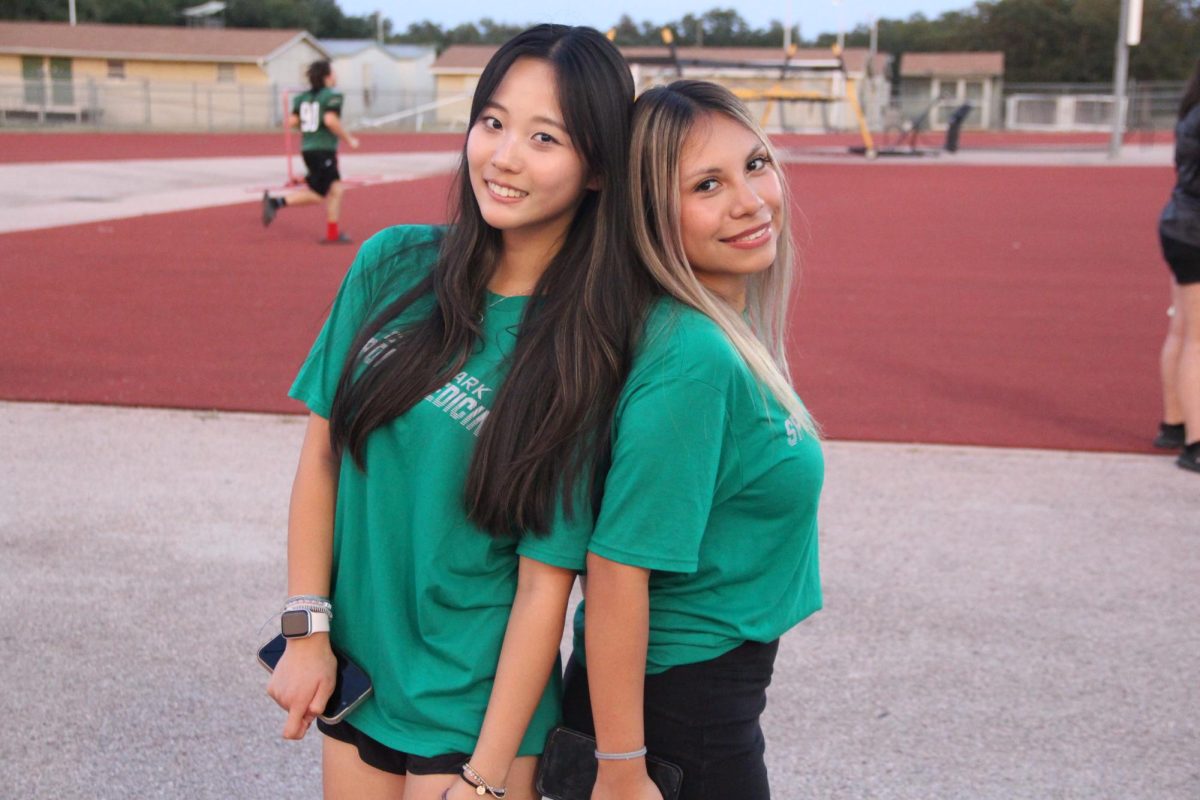


![Looking down at his racket, junior Hasun Nguyen hits the green tennis ball. Hasun has played tennis since he was 9 years old, and he is on the varsity team. "I feel like it’s not really appreciated in America as much, but [tennis] is a really competitive and mentally challenging sport,” Nguyen said. “I’m really level-headed and can keep my cool during a match, and that helps me play a bit better under pressure.” Photo by Kyra Cox](https://cphswolfpack.com/wp-content/uploads/2025/09/hasun.jpg)

![Bringing her arm over her head and taking a quick breath, junior Lauren Lucas swims the final laps of the 500 freestyle at the regionals swimming competition on date. Lucas broke the school’s 18-year-old record for the 500 freestyle at regionals and again at state with a time of 4:58.63. “I’d had my eye on that 500 record since my freshman year, so I was really excited to see if I could get it at regionals or districts,” Lucas said. “ State is always a really fun experience and medaling for the first time was really great. It was a very very tight race, [so] I was a bit surprised [that I medaled]. [There were] a lot of fast girls at the meet in general, [and] it was like a dogfight back and forth, back and forth.” Photo by Kaydence Wilkinson](https://cphswolfpack.com/wp-content/uploads/2025/03/Kaydence-2.7-23-edit-2.jpg)
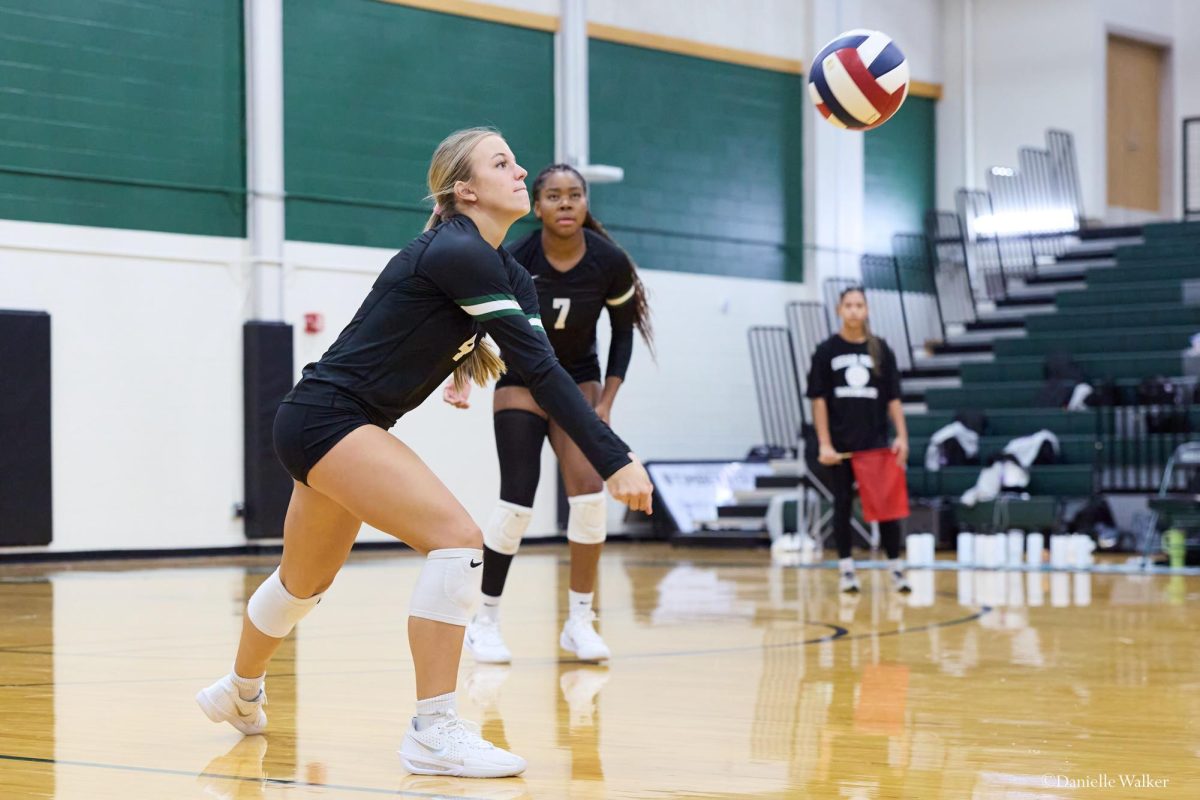

![As her hair blows in the wind, senior Brianna Grandow runs the varsity girls 5K at the cross country district meet last Thursday. Grandow finished fourth in the event and led the varsity girls to regionals with a third place placement as a team. “I’m very excited [to go to regionals],” Grandow said. “I’m excited to race in Corpus Christi, and we get to go to the beach, so that’s really awesome.” Photo by Addison Bruce](https://cphswolfpack.com/wp-content/uploads/2025/10/brianna.jpg)

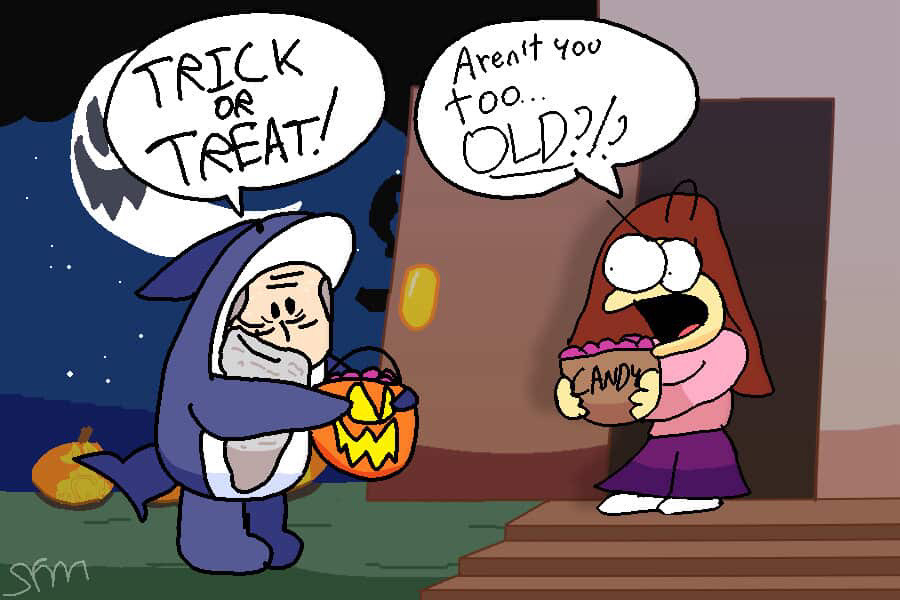













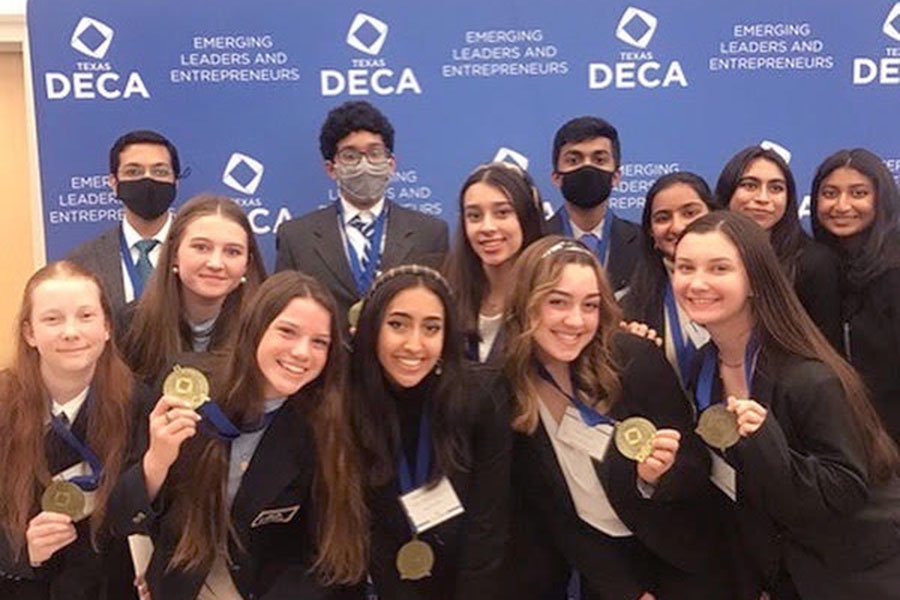
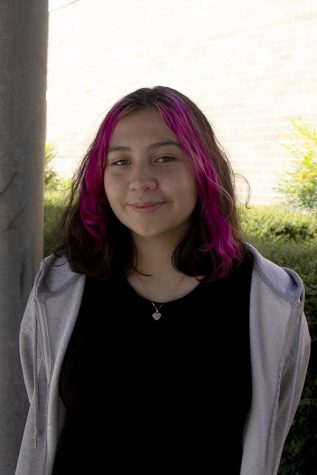
![Holding a microphone, baseball booster club president Chris Cuevas announces the beginning of the annual cornhole tournament. The event has been held for the past two years and is designed to raise money for the baseball program in a fun way. “We’re a baseball team, so people love to compete,” Cuevas said. “So we figured we better do something that gets [their] attention. They want to compete. It’s not a hard sport to do, and we have all different [skill] levels [of participants].” Photo by Henry Mueller](https://cphswolfpack.com/wp-content/uploads/2025/11/Henry-715-1200x900.jpg)
